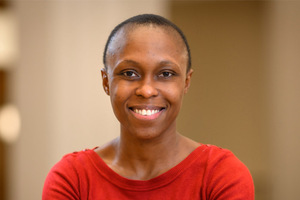
Sarah Nanjala is a first year Master of Global Affairs, International Peace Studies student. A Kenyan, she was born and raised in Nairobi, a location that has played a significant role in her life. A journalist by training, Sarah observed frequent electoral violence in her home country and wanted to study at the University of Notre Dame in order to expand her knowledge on how to address and prevent this kind of conflict.
In this interview, she shares her internship aspirations and talks about her past working with the media.
What drew you to the Master of Global Affairs, International Peace Studies program?
I was working as a journalist in Kenya, and during my undergraduate studies, I completed a course called “Peace Journalism.” It was very interesting for me to see how journalism and peace studies intertwined. In Kenya, we have issues of election violence, and there were many implications in this class for the role of the media in the conflict. For me, it was a learning process because I came to realize how important it was for journalists to be aware of conflict issues and how their work can either increase or reduce violence.
I joined this program as I was trying to find more meaning. As a journalist, I felt like my work was very limited. I was mostly reporting on things, but I really didn't see whether I was bringing peace into a conflict situation. That is what drew me to want to be part of the peace studies program. Joining this program allows me to be more of a participant in peace processes and in conflict prevention and transformation.
What aspects of your journalism work have helped you during the program?
My professional background and my experience observing election violence in Kenya give me a different angle. For example, I can see and understand better the forces influencing conflicts. I also get to see how reporting and interviewing people can affect them. I see how sharing information on certain issues can influence progress in conflict situations.
Where will you be interning as part of the MGA program?
I will be interning at the Nonviolent Peaceforce, a global civilian protection agency focused on humanitarian and international human rights law with offices. I will be part of the Advocacy Team in Washington, D.C., where we will be working and partnering with other organizations in promoting the adoption of nonviolent approaches to tackling conflict such as Unarmed Civilian Protection (UCP) programs. My team and I will be engaging key decision makers as well as multilateral organizations in implementing some of these strategies. I am really excited.
What has been your favorite class so far and why?
I really liked the mediation class because I enjoy the discussions and Professor Laurie Nathan’s approach to them. We talk about how to improve dialogue between conflicting parties and understand the dynamics of conflict. I like how engaging it is because we were involved in very practical simulation exercises.
Another class that I enjoyed was “Peace, Violence, and Development” with Professor Caroline Hughes. It helped me understand connections between peace and economic development.
Where would you place yourself on the strategic peacebuilding wheel?
I'm definitely on the violence prevention, conflict response, and transformation spectrum. I also see myself in dialogue, conflict resolution strategies, and nonviolent social change. I think these areas are very much intertwined.